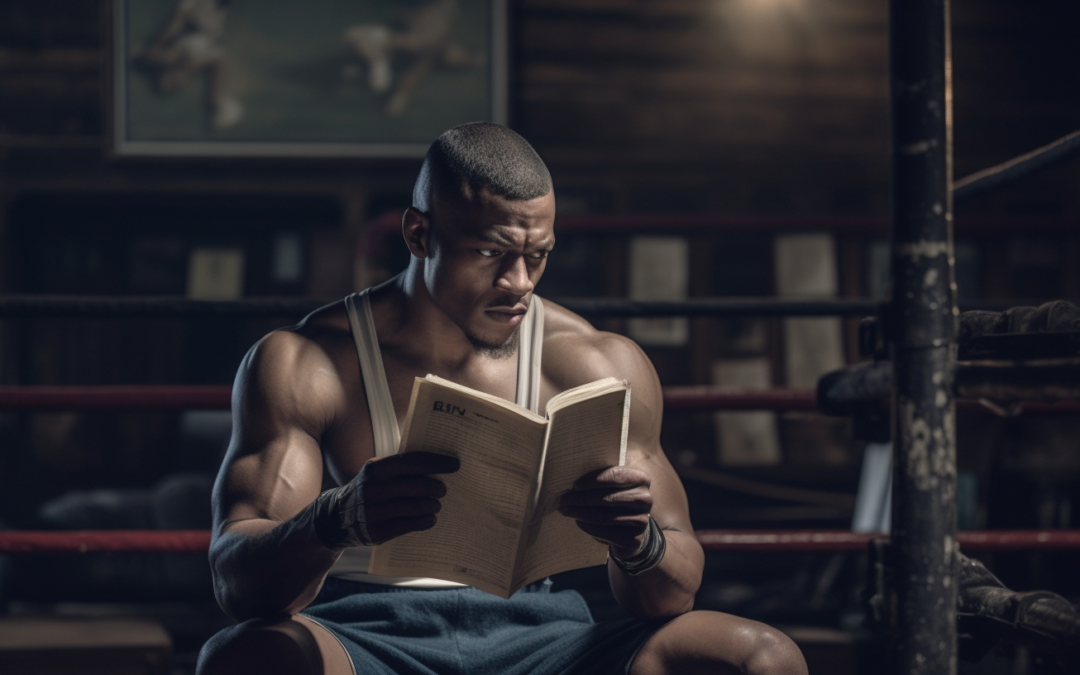Being a creative writing major, one could expect me to be writing five days a week. Instead, I get punched in the head five days a week. I’ve been training Muay Thai for the past year and a half and recently had my first fight. There’s a level of guilt I hold for not being uber passionate about my major, but I also submit to the idea that passion needs to be cultivated. I haven’t always been passionate about Muay Thai—it typically intimidates me—but my dedication to it has made giving it up a disservice to myself. Reflecting on the effort athletes put into sports is useful for athletes with a taste for writing and for writers with a taste in athletics to develop methods to hone their craft.
The intention isn’t to look like Stephen King in the boxing ring nor Mike Tyson at a writing seminar. It’s to craft ourselves into Decathlon athletes who are really good at a variety of things. Translating what we do best into other areas is the true mark of versatility and an embodiment of our growth and adaptability.
Here are some things I do as an athlete that can translate to good writing practices:
Discipline and Routine: It would be silly for anyone to expect their first time stepping onto a Judo mat to become a champion. I know that in order to succeed, I need to be in the gym as often as possible. As practitioners, we have to make a commitment to our arts in order to improve. Establishing discipline and routine into our writing can bring consistency in our improvement. Kind of like muscle memory. Train often enough, notice the combos coming consistently. Write often enough, notice the solid writing coming consistently.
Stretching: It’s hard to imagine throwing 720 Hook Kicks without stretching. Our minds and bodies need to be limbered up before we practice. I make sure to show up 30 minutes before training to stretch which increases flexibility and in turn leads to more space for success. I also feel like my focus readjusts to the task ahead instead of other happenings of the day. Writing before thinking about writing can come out as rusty or difficult to start. Why not take a few moments to free-write, or do a butterfly stretch before writing? Don’t forget to stretch after exercising as well. Hard work can be exhausting on the mind and without a cool down, we might not be prepared for tomorrow.
Working Together: During every Muay Thai class, we’re always training with someone. Whether it’s having a partner hold Thai pads or focus mitts, asking for advice, or sparring, it’s a group effort to improve. The same should be said for writing. Writers can have another set of eyes look over their writing. Not only can a partner catch errors that have gone unnoticed, but they can help identify what you’re excelling at. Just important as critique is the recognition of what is working in your routine.
The Showcase: All of our work needs to be put towards something. I don’t bang my bruised shins on heavy bags just to labor myself. I want to be recognized as a hard-worker and a talented fighter. In that same vein, writers shouldn’t write just for good grades. The intention is to be excellent at what we do. I’ve fought in a Smoker to see if I was cut out for a fight. Though it wasn’t everything I had imagined (judges’ score said I lost), I learned so much on what it meant to be a successful fighter. Participating in workshop groups can be a Smoker for writers before submitting their proudest writing to contests and journals. Maybe the piece isn’t the most well received, but through this low-stakes display, we’re given a chance to make it better.
I’m not the strongest writer, nor am I the strongest athlete. But effort matters. If I want to be a successful writer, I have the ethic to craft it.
Meet the blogger:
 CODIE OLSON is a struggling writer who struggles to write. Though he cannot physically juggle, his life is quite the juggling act. He intends on graduating from Hamline University in Spring 2024 with a BFA in creative writing.
CODIE OLSON is a struggling writer who struggles to write. Though he cannot physically juggle, his life is quite the juggling act. He intends on graduating from Hamline University in Spring 2024 with a BFA in creative writing.


